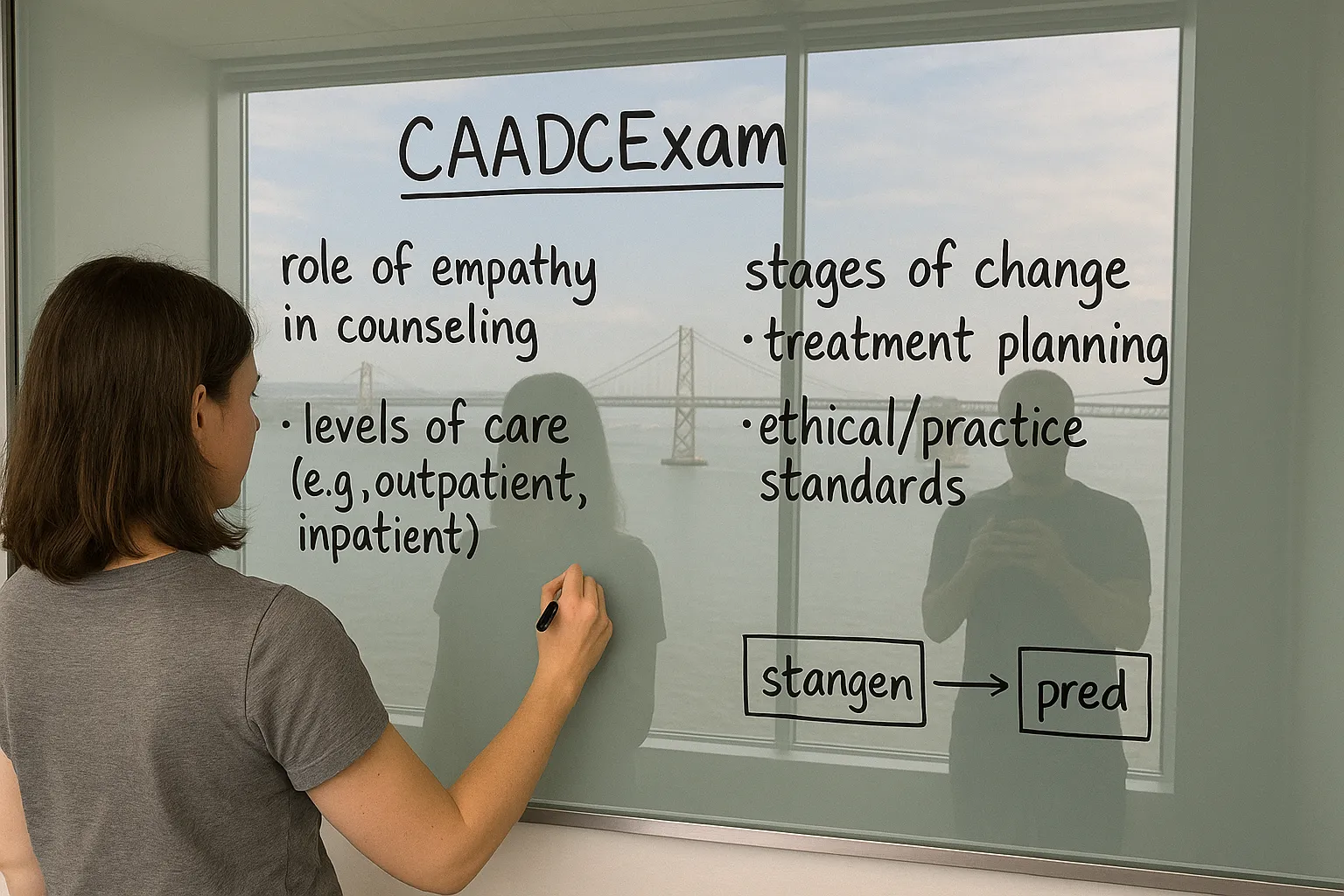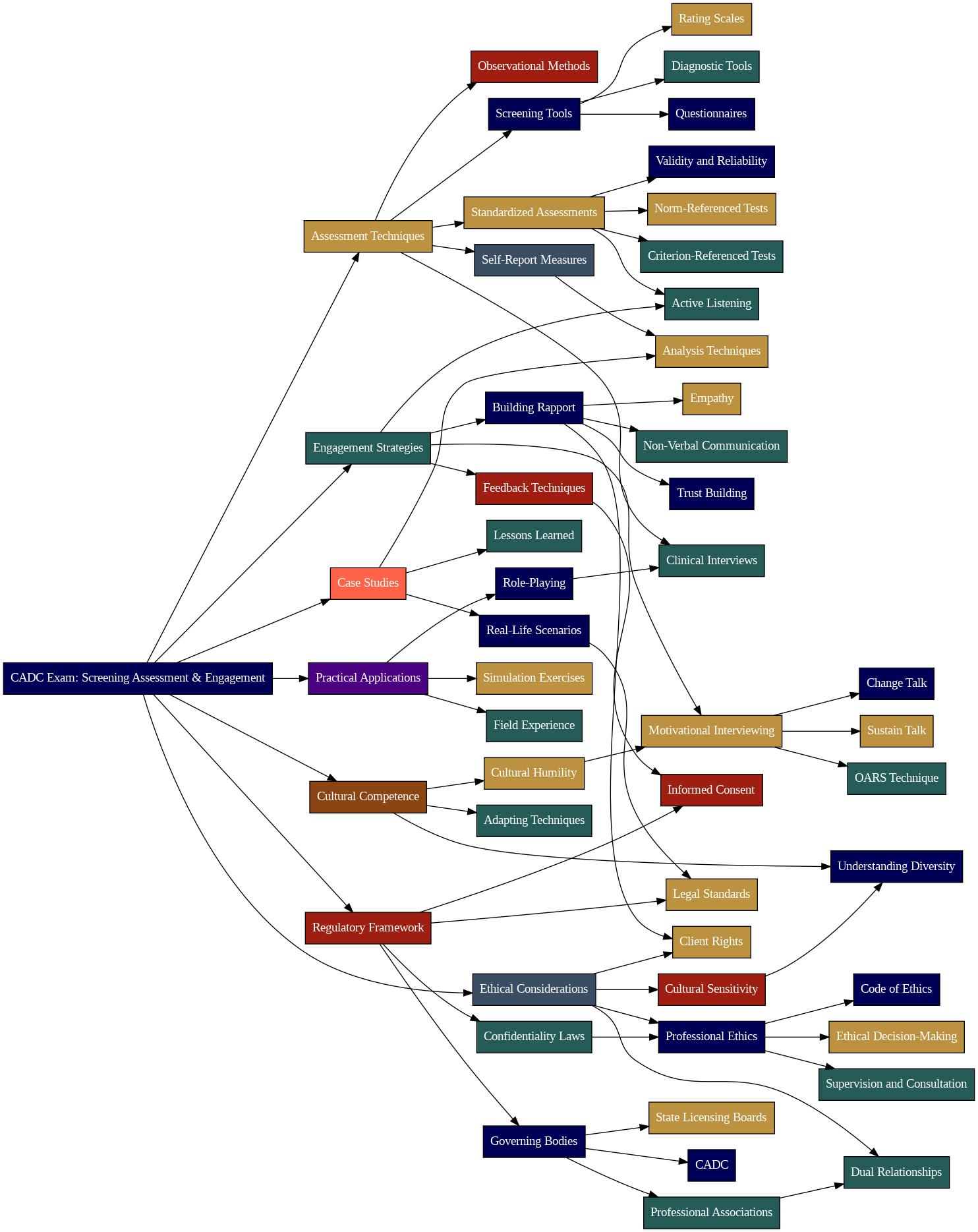Quiz-summary
0 of 30 questions completed
Questions:
- 1
- 2
- 3
- 4
- 5
- 6
- 7
- 8
- 9
- 10
- 11
- 12
- 13
- 14
- 15
- 16
- 17
- 18
- 19
- 20
- 21
- 22
- 23
- 24
- 25
- 26
- 27
- 28
- 29
- 30
Information
Premium Practice Questions
You have already completed the quiz before. Hence you can not start it again.
Quiz is loading...
You must sign in or sign up to start the quiz.
You have to finish following quiz, to start this quiz:
Results
0 of 30 questions answered correctly
Your time:
Time has elapsed
Categories
- Not categorized 0%
- 1
- 2
- 3
- 4
- 5
- 6
- 7
- 8
- 9
- 10
- 11
- 12
- 13
- 14
- 15
- 16
- 17
- 18
- 19
- 20
- 21
- 22
- 23
- 24
- 25
- 26
- 27
- 28
- 29
- 30
- Answered
- Review
-
Question 1 of 30
1. Question
A Kentucky LCADC suspects that a colleague is consistently billing clients for services not rendered. What is the MOST ethical course of action for the LCADC to take?
Correct
When dealing with potential ethical violations by colleagues, Kentucky LCADCs should follow a specific protocol. First, if the violation is minor and appears unintentional, a direct conversation with the colleague is often the best initial step. If the violation is more serious, or the colleague does not rectify the behavior, reporting to the Kentucky Board of Alcohol and Drug Counselors is necessary. Ignoring the violation is unethical and potentially harmful to clients. The primary goal is to protect clients and uphold the ethical standards of the profession.
Incorrect
When dealing with potential ethical violations by colleagues, Kentucky LCADCs should follow a specific protocol. First, if the violation is minor and appears unintentional, a direct conversation with the colleague is often the best initial step. If the violation is more serious, or the colleague does not rectify the behavior, reporting to the Kentucky Board of Alcohol and Drug Counselors is necessary. Ignoring the violation is unethical and potentially harmful to clients. The primary goal is to protect clients and uphold the ethical standards of the profession.
-
Question 2 of 30
2. Question
A private outpatient substance use treatment facility in Kentucky is seeking accreditation. During the accreditation review, the surveyors identify that several counselors are utilizing treatment approaches that lack empirical support and are not recognized as evidence-based practices. According to Kentucky laws and regulations regarding substance use treatment programs, what is the MOST likely outcome of this finding?
Correct
Kentucky’s laws and regulations regarding substance use treatment programs emphasize the importance of qualified personnel, adherence to ethical standards, and the provision of evidence-based practices. Treatment programs must be licensed by the state and must meet specific requirements related to staffing, facilities, and service delivery. The Kentucky Board of Alcohol and Drug Counselors regulates the licensure of LCADCs and other addiction professionals, ensuring that they meet minimum qualifications and adhere to a code of ethics. Treatment programs must employ qualified staff who have the necessary education, training, and experience to provide effective substance use treatment services. Counselors must be knowledgeable about evidence-based practices, such as cognitive behavioral therapy, motivational interviewing, and medication-assisted treatment, and they must use these practices in their work with clients. Treatment programs must also have policies and procedures in place to ensure client safety and confidentiality. These policies must comply with state and federal laws, including HIPAA and 42 CFR Part 2. Furthermore, treatment programs must regularly evaluate their services to ensure that they are meeting the needs of their clients and achieving positive outcomes. This may involve collecting data on client outcomes, conducting client satisfaction surveys, and participating in quality improvement initiatives. Adherence to these laws and regulations is essential for providing high-quality substance use treatment services in Kentucky.
Incorrect
Kentucky’s laws and regulations regarding substance use treatment programs emphasize the importance of qualified personnel, adherence to ethical standards, and the provision of evidence-based practices. Treatment programs must be licensed by the state and must meet specific requirements related to staffing, facilities, and service delivery. The Kentucky Board of Alcohol and Drug Counselors regulates the licensure of LCADCs and other addiction professionals, ensuring that they meet minimum qualifications and adhere to a code of ethics. Treatment programs must employ qualified staff who have the necessary education, training, and experience to provide effective substance use treatment services. Counselors must be knowledgeable about evidence-based practices, such as cognitive behavioral therapy, motivational interviewing, and medication-assisted treatment, and they must use these practices in their work with clients. Treatment programs must also have policies and procedures in place to ensure client safety and confidentiality. These policies must comply with state and federal laws, including HIPAA and 42 CFR Part 2. Furthermore, treatment programs must regularly evaluate their services to ensure that they are meeting the needs of their clients and achieving positive outcomes. This may involve collecting data on client outcomes, conducting client satisfaction surveys, and participating in quality improvement initiatives. Adherence to these laws and regulations is essential for providing high-quality substance use treatment services in Kentucky.
-
Question 3 of 30
3. Question
A new client, Jamar, begins treatment with an LCADC in Kentucky for alcohol use disorder. During the initial session, the LCADC provides Jamar with a comprehensive overview of the treatment process. Which of the following actions by the LCADC BEST exemplifies adherence to ethical guidelines regarding client rights and responsibilities?
Correct
Kentucky’s regulations for LCADCs regarding client rights and responsibilities are grounded in ethical principles and legal standards designed to protect clients and promote their autonomy in the treatment process. Key rights include the right to informed consent, confidentiality, access to records, and the right to refuse or withdraw from treatment. Clients also have the responsibility to actively participate in their treatment, provide accurate information, and adhere to agreed-upon treatment plans. LCADCs must ensure that clients are fully informed about their rights and responsibilities at the outset of treatment and throughout the counseling process. This includes providing clear explanations of treatment goals, methods, potential risks and benefits, and alternatives to treatment. Clients should also be informed about their right to file a complaint if they believe their rights have been violated.
Incorrect
Kentucky’s regulations for LCADCs regarding client rights and responsibilities are grounded in ethical principles and legal standards designed to protect clients and promote their autonomy in the treatment process. Key rights include the right to informed consent, confidentiality, access to records, and the right to refuse or withdraw from treatment. Clients also have the responsibility to actively participate in their treatment, provide accurate information, and adhere to agreed-upon treatment plans. LCADCs must ensure that clients are fully informed about their rights and responsibilities at the outset of treatment and throughout the counseling process. This includes providing clear explanations of treatment goals, methods, potential risks and benefits, and alternatives to treatment. Clients should also be informed about their right to file a complaint if they believe their rights have been violated.
-
Question 4 of 30
4. Question
A Kentucky LCADC working in a rural community discovers that a new client is also the daughter of his long-time family friend. He has known the client since she was a child and occasionally sees her at community events. What is the MOST ethically sound approach for the LCADC to take in this situation?
Correct
According to Kentucky regulations and ethical guidelines for LCADCs, dual relationships (also known as multiple relationships) occur when a counselor has a professional relationship with a client and also another significantly different relationship with that person (e.g., social, business, familial). These relationships can impair objectivity, competence, or effectiveness in providing counseling services and can exploit or harm the client. While some dual relationships are explicitly prohibited (e.g., sexual relationships with clients), others require careful consideration and management. Factors to consider include the power differential between the counselor and client, the potential for exploitation, and the clarity of boundaries. In small communities, avoiding all dual relationships may be impossible; however, the LCADC must prioritize the client’s welfare and take steps to minimize potential harm, such as seeking supervision, documenting the rationale for the dual relationship, and obtaining informed consent from the client.
Incorrect
According to Kentucky regulations and ethical guidelines for LCADCs, dual relationships (also known as multiple relationships) occur when a counselor has a professional relationship with a client and also another significantly different relationship with that person (e.g., social, business, familial). These relationships can impair objectivity, competence, or effectiveness in providing counseling services and can exploit or harm the client. While some dual relationships are explicitly prohibited (e.g., sexual relationships with clients), others require careful consideration and management. Factors to consider include the power differential between the counselor and client, the potential for exploitation, and the clarity of boundaries. In small communities, avoiding all dual relationships may be impossible; however, the LCADC must prioritize the client’s welfare and take steps to minimize potential harm, such as seeking supervision, documenting the rationale for the dual relationship, and obtaining informed consent from the client.
-
Question 5 of 30
5. Question
During a counseling session in Kentucky, a client, Mark, expresses anger towards his estranged wife and states, “I’m so angry, I could kill her.” While Mark has a history of verbal aggression, he has never been physically violent. According to Kentucky’s ethical guidelines and legal considerations, what is the LCADC’s MOST appropriate initial course of action?
Correct
Kentucky law does not explicitly define a “duty to warn” in the same way as some other states following the Tarasoff decision. However, Kentucky LCADCs operate under a general ethical obligation to protect potential victims from imminent harm. This obligation arises from the broader ethical principles of beneficence (doing good) and non-maleficence (doing no harm). While confidentiality is paramount, it is not absolute. When a client presents a clear and imminent threat of serious physical harm to a readily identifiable victim or victims, the LCADC may have a duty to take reasonable steps to prevent that harm. These steps could include notifying the potential victim, contacting law enforcement, or initiating involuntary hospitalization. The decision to breach confidentiality in such situations should be made carefully, with consideration of the specific circumstances and consultation with supervisors or legal counsel. The focus is on balancing the client’s right to confidentiality with the counselor’s responsibility to protect public safety.
Incorrect
Kentucky law does not explicitly define a “duty to warn” in the same way as some other states following the Tarasoff decision. However, Kentucky LCADCs operate under a general ethical obligation to protect potential victims from imminent harm. This obligation arises from the broader ethical principles of beneficence (doing good) and non-maleficence (doing no harm). While confidentiality is paramount, it is not absolute. When a client presents a clear and imminent threat of serious physical harm to a readily identifiable victim or victims, the LCADC may have a duty to take reasonable steps to prevent that harm. These steps could include notifying the potential victim, contacting law enforcement, or initiating involuntary hospitalization. The decision to breach confidentiality in such situations should be made carefully, with consideration of the specific circumstances and consultation with supervisors or legal counsel. The focus is on balancing the client’s right to confidentiality with the counselor’s responsibility to protect public safety.
-
Question 6 of 30
6. Question
A Kentucky LCADC, Jamila, begins offering telehealth services to clients in rural areas of the state who have limited access to in-person treatment. Which of the following actions would BEST demonstrate Jamila’s adherence to ethical and legal standards specific to telehealth in Kentucky?
Correct
In Kentucky, counselors operating via telehealth must adhere to specific ethical and legal guidelines to ensure client welfare and professional integrity. These guidelines are informed by both state regulations and broader ethical principles governing the counseling profession. The Kentucky Board of Licensed Professional Counselors (KBLPC) provides specific guidance on telehealth practices, emphasizing the importance of informed consent, confidentiality, and competence in using technology. A crucial aspect of ethical telehealth is ensuring clients understand the potential risks and benefits of receiving services remotely. This includes discussing the limitations of technology, such as potential breaches of confidentiality, technical failures, and the inability to provide immediate crisis intervention. Informed consent in telehealth must also cover the counselor’s qualifications to provide services via technology, the security measures in place to protect client information, and alternative options for in-person services if needed. Counselors must also verify the client’s location during each session to comply with jurisdictional regulations and ensure appropriate emergency services can be accessed if necessary. Furthermore, counselors should be mindful of cultural and linguistic differences when providing telehealth services and adapt their approach to meet the unique needs of each client. Adherence to HIPAA regulations is paramount, requiring counselors to use secure platforms and protect electronic health information. Counselors should also stay updated on evolving telehealth laws and ethical standards to maintain competence and provide the highest quality of care. The scenario underscores the need for a comprehensive understanding of these ethical and legal considerations to protect clients and uphold professional standards.
Incorrect
In Kentucky, counselors operating via telehealth must adhere to specific ethical and legal guidelines to ensure client welfare and professional integrity. These guidelines are informed by both state regulations and broader ethical principles governing the counseling profession. The Kentucky Board of Licensed Professional Counselors (KBLPC) provides specific guidance on telehealth practices, emphasizing the importance of informed consent, confidentiality, and competence in using technology. A crucial aspect of ethical telehealth is ensuring clients understand the potential risks and benefits of receiving services remotely. This includes discussing the limitations of technology, such as potential breaches of confidentiality, technical failures, and the inability to provide immediate crisis intervention. Informed consent in telehealth must also cover the counselor’s qualifications to provide services via technology, the security measures in place to protect client information, and alternative options for in-person services if needed. Counselors must also verify the client’s location during each session to comply with jurisdictional regulations and ensure appropriate emergency services can be accessed if necessary. Furthermore, counselors should be mindful of cultural and linguistic differences when providing telehealth services and adapt their approach to meet the unique needs of each client. Adherence to HIPAA regulations is paramount, requiring counselors to use secure platforms and protect electronic health information. Counselors should also stay updated on evolving telehealth laws and ethical standards to maintain competence and provide the highest quality of care. The scenario underscores the need for a comprehensive understanding of these ethical and legal considerations to protect clients and uphold professional standards.
-
Question 7 of 30
7. Question
During a counseling session in Lexington, Kentucky, LCADC Imani learns that her client, Javier, occasionally leaves his 7-year-old child, Mateo, home alone for approximately 30 minutes while he runs to the grocery store. Javier assures Imani that Mateo is responsible and has never had any issues. Considering Kentucky’s mandatory reporting laws, what is Imani’s most appropriate course of action?
Correct
In Kentucky, LCADCs are mandated reporters, meaning they are legally obligated to report suspected child abuse or neglect. This duty stems from Kentucky Revised Statutes (KRS) Chapter 620, which outlines the procedures and requirements for reporting child abuse and neglect. The question explores a scenario where an LCADC gains information during a counseling session that suggests a child is at risk. The key is to understand the threshold for reporting, which isn’t absolute certainty but rather a reasonable suspicion. KRS 620.030 states that any person who knows or has reasonable cause to believe that a child is dependent, neglected, or abused shall immediately report the dependency, neglect, or abuse to the Department for Community Based Services (DCBS) or law enforcement. Reasonable cause is interpreted as having enough information that a prudent person would suspect abuse or neglect. The counselor’s professional judgment, guided by their training and experience, plays a crucial role in determining whether the information meets this threshold. The LCADC must prioritize the child’s safety and well-being, even if it means potentially breaching client confidentiality (within legal limits). Failure to report suspected abuse or neglect can result in legal penalties for the LCADC. Furthermore, it’s important to understand that the report initiates an investigation by DCBS, which will then determine the validity of the concerns and take appropriate action to protect the child.
Incorrect
In Kentucky, LCADCs are mandated reporters, meaning they are legally obligated to report suspected child abuse or neglect. This duty stems from Kentucky Revised Statutes (KRS) Chapter 620, which outlines the procedures and requirements for reporting child abuse and neglect. The question explores a scenario where an LCADC gains information during a counseling session that suggests a child is at risk. The key is to understand the threshold for reporting, which isn’t absolute certainty but rather a reasonable suspicion. KRS 620.030 states that any person who knows or has reasonable cause to believe that a child is dependent, neglected, or abused shall immediately report the dependency, neglect, or abuse to the Department for Community Based Services (DCBS) or law enforcement. Reasonable cause is interpreted as having enough information that a prudent person would suspect abuse or neglect. The counselor’s professional judgment, guided by their training and experience, plays a crucial role in determining whether the information meets this threshold. The LCADC must prioritize the child’s safety and well-being, even if it means potentially breaching client confidentiality (within legal limits). Failure to report suspected abuse or neglect can result in legal penalties for the LCADC. Furthermore, it’s important to understand that the report initiates an investigation by DCBS, which will then determine the validity of the concerns and take appropriate action to protect the child.
-
Question 8 of 30
8. Question
An LCADC in Kentucky begins providing telehealth services to a new client residing in a rural part of the state. During the initial session, the counselor neglects to confirm the client’s exact physical location, assuming it’s the address provided on the intake form. The client later experiences a severe panic attack during a session, expressing suicidal ideation. The counselor struggles to determine the nearest emergency services to dispatch. Which ethical principle has the LCADC most clearly violated?
Correct
Kentucky’s regulations regarding telehealth for LCADCs emphasize the importance of informed consent, ensuring clients understand the nature of telehealth services, potential risks and benefits, and their right to withdraw consent at any time. A key aspect of ethical telehealth practice is ensuring the client’s location during the session is known, particularly in crisis situations. This allows the counselor to connect the client with local emergency services if needed, fulfilling the duty to protect the client from harm. KRS 205.631 outlines the requirements for telehealth providers in Kentucky, emphasizing the need for equivalent standards of care as in-person services, including maintaining confidentiality and addressing crisis situations effectively. Failing to ascertain the client’s location and having a plan for local intervention constitutes a significant ethical breach, potentially leading to disciplinary action. Furthermore, it’s essential to understand that while technology offers convenience, it does not supersede the core ethical obligations of an LCADC, including the duty to protect and the requirement for informed consent. The LCADC must adhere to HIPAA regulations regarding protected health information (PHI) and ensure the telehealth platform is secure and compliant. Ignoring the client’s location and failing to establish a crisis plan demonstrates a lack of due diligence and a disregard for client safety, violating the principles of beneficence and non-maleficence.
Incorrect
Kentucky’s regulations regarding telehealth for LCADCs emphasize the importance of informed consent, ensuring clients understand the nature of telehealth services, potential risks and benefits, and their right to withdraw consent at any time. A key aspect of ethical telehealth practice is ensuring the client’s location during the session is known, particularly in crisis situations. This allows the counselor to connect the client with local emergency services if needed, fulfilling the duty to protect the client from harm. KRS 205.631 outlines the requirements for telehealth providers in Kentucky, emphasizing the need for equivalent standards of care as in-person services, including maintaining confidentiality and addressing crisis situations effectively. Failing to ascertain the client’s location and having a plan for local intervention constitutes a significant ethical breach, potentially leading to disciplinary action. Furthermore, it’s essential to understand that while technology offers convenience, it does not supersede the core ethical obligations of an LCADC, including the duty to protect and the requirement for informed consent. The LCADC must adhere to HIPAA regulations regarding protected health information (PHI) and ensure the telehealth platform is secure and compliant. Ignoring the client’s location and failing to establish a crisis plan demonstrates a lack of due diligence and a disregard for client safety, violating the principles of beneficence and non-maleficence.
-
Question 9 of 30
9. Question
A Kentucky LCADC, Dr. Ramirez, is providing court-ordered substance abuse treatment to a client, Ms. Nguyen, following a positive drug test while she was on probation. Ms. Nguyen reveals to Dr. Ramirez that she relapsed due to severe financial hardship and the threat of eviction. Ms. Nguyen begs Dr. Ramirez not to disclose this information to the court, fearing immediate incarceration. According to Kentucky law and ethical guidelines, what is Dr. Ramirez’s *most ethically and legally sound* course of action?
Correct
The scenario involves a client mandated to treatment who denies having a substance use problem. Motivational Interviewing (MI) principles emphasize empathy, collaboration, and autonomy. The *most appropriate* initial response aligns with these principles. 1. **Empathy and Understanding**: Expressing empathy and understanding validates Marcus’s feelings and creates a safe space for him to explore his ambivalence. 2. **Exploring Ambivalence**: MI aims to help clients explore their own reasons for change. Gently exploring Marcus’s ambivalence about marijuana use can help him identify potential discrepancies between his values and his behavior. 3. **Open-Ended Questions and Reflective Listening**: Using open-ended questions and reflective listening encourages Marcus to reflect on his own experiences and perspectives, rather than feeling judged or confronted. 4. **Avoiding Confrontation**: Directly challenging Marcus’s denial or confronting him about the dangers of marijuana use is likely to increase his resistance and undermine the therapeutic relationship. 5. **Respecting Autonomy**: MI respects the client’s autonomy and right to make their own decisions. The goal is not to force Marcus to admit he has a problem, but rather to help him explore his own motivations for change. By expressing empathy, exploring ambivalence, and using open-ended questions and reflective listening, Javier can create a therapeutic environment that fosters trust and facilitates Marcus’s own exploration of his substance use.
Incorrect
The scenario involves a client mandated to treatment who denies having a substance use problem. Motivational Interviewing (MI) principles emphasize empathy, collaboration, and autonomy. The *most appropriate* initial response aligns with these principles. 1. **Empathy and Understanding**: Expressing empathy and understanding validates Marcus’s feelings and creates a safe space for him to explore his ambivalence. 2. **Exploring Ambivalence**: MI aims to help clients explore their own reasons for change. Gently exploring Marcus’s ambivalence about marijuana use can help him identify potential discrepancies between his values and his behavior. 3. **Open-Ended Questions and Reflective Listening**: Using open-ended questions and reflective listening encourages Marcus to reflect on his own experiences and perspectives, rather than feeling judged or confronted. 4. **Avoiding Confrontation**: Directly challenging Marcus’s denial or confronting him about the dangers of marijuana use is likely to increase his resistance and undermine the therapeutic relationship. 5. **Respecting Autonomy**: MI respects the client’s autonomy and right to make their own decisions. The goal is not to force Marcus to admit he has a problem, but rather to help him explore his own motivations for change. By expressing empathy, exploring ambivalence, and using open-ended questions and reflective listening, Javier can create a therapeutic environment that fosters trust and facilitates Marcus’s own exploration of his substance use.
-
Question 10 of 30
10. Question
A licensed clinical alcohol and drug counselor (LCADC) in Kentucky, Anya, begins offering telehealth services to her clients without obtaining explicit informed consent for telehealth, uses a video conferencing platform that is not HIPAA compliant, and does not verify if her professional liability insurance covers telehealth services in Kentucky. Which of the following ethical and legal violations has Anya most likely committed?
Correct
Kentucky’s regulations regarding telehealth for substance use disorder treatment emphasize adherence to the same ethical standards as in-person counseling. This includes obtaining informed consent specifically for telehealth services, ensuring client confidentiality through secure platforms, and being aware of the limitations of technology. Counselors must be licensed in Kentucky to provide telehealth services to clients located in Kentucky. Kentucky-specific regulations also address the documentation requirements for telehealth sessions and the need for counselors to be competent in using the technology involved. A counselor who provides telehealth services without proper informed consent, using a non-secure platform, and without a Kentucky license would be violating multiple ethical and legal standards. Such actions could lead to disciplinary action by the Kentucky Board of Alcohol and Drug Counselors. Furthermore, a counselor is obligated to understand and abide by HIPAA regulations, as well as any additional state-specific laws concerning the privacy and security of client information transmitted electronically. It is also crucial to consider the client’s access to technology and digital literacy when offering telehealth services, ensuring equitable access to care.
Incorrect
Kentucky’s regulations regarding telehealth for substance use disorder treatment emphasize adherence to the same ethical standards as in-person counseling. This includes obtaining informed consent specifically for telehealth services, ensuring client confidentiality through secure platforms, and being aware of the limitations of technology. Counselors must be licensed in Kentucky to provide telehealth services to clients located in Kentucky. Kentucky-specific regulations also address the documentation requirements for telehealth sessions and the need for counselors to be competent in using the technology involved. A counselor who provides telehealth services without proper informed consent, using a non-secure platform, and without a Kentucky license would be violating multiple ethical and legal standards. Such actions could lead to disciplinary action by the Kentucky Board of Alcohol and Drug Counselors. Furthermore, a counselor is obligated to understand and abide by HIPAA regulations, as well as any additional state-specific laws concerning the privacy and security of client information transmitted electronically. It is also crucial to consider the client’s access to technology and digital literacy when offering telehealth services, ensuring equitable access to care.
-
Question 11 of 30
11. Question
A Kentucky LCADC, Jamila, is working with a client, David, who has a history of severe opioid use disorder. During a session, David discloses that he has relapsed and is experiencing intense cravings and suicidal ideation, including a detailed plan to overdose. He begs Jamila not to tell anyone. According to Kentucky regulations and ethical guidelines for LCADCs, what is Jamila’s MOST appropriate initial course of action?
Correct
In Kentucky, ethical decision-making for LCADCs is guided by several key principles and regulations, including the ACA Code of Ethics (often adopted or adapted by state licensing boards), Kentucky statutes related to substance abuse treatment (KRS Chapter 210 and 222), and specific regulations from the Kentucky Board of Alcohol and Drug Counselors. When faced with an ethical dilemma, a structured decision-making model is crucial. A commonly used model involves identifying the problem, reviewing relevant ethical codes and laws, considering potential courses of action, consulting with supervisors or colleagues, evaluating the consequences of each action, and implementing the chosen course of action while documenting the process. In this scenario, the most ethical course of action prioritizes client safety and adheres to legal requirements, while also considering the potential impact on the counselor-client relationship. Abandoning a client in crisis would violate ethical principles of non-maleficence and fidelity. Reporting the client’s intentions to the authorities is a complex decision that must balance confidentiality with the duty to protect. Seeking supervision is essential to ensure the counselor is making an informed and ethical decision. While encouraging the client to voluntarily seek hospitalization might be beneficial, it doesn’t address the immediate risk of harm. The counselor’s primary responsibility is to ensure the client’s safety and the safety of others, even if it means breaching confidentiality under specific circumstances outlined by Kentucky law and ethical guidelines.
Incorrect
In Kentucky, ethical decision-making for LCADCs is guided by several key principles and regulations, including the ACA Code of Ethics (often adopted or adapted by state licensing boards), Kentucky statutes related to substance abuse treatment (KRS Chapter 210 and 222), and specific regulations from the Kentucky Board of Alcohol and Drug Counselors. When faced with an ethical dilemma, a structured decision-making model is crucial. A commonly used model involves identifying the problem, reviewing relevant ethical codes and laws, considering potential courses of action, consulting with supervisors or colleagues, evaluating the consequences of each action, and implementing the chosen course of action while documenting the process. In this scenario, the most ethical course of action prioritizes client safety and adheres to legal requirements, while also considering the potential impact on the counselor-client relationship. Abandoning a client in crisis would violate ethical principles of non-maleficence and fidelity. Reporting the client’s intentions to the authorities is a complex decision that must balance confidentiality with the duty to protect. Seeking supervision is essential to ensure the counselor is making an informed and ethical decision. While encouraging the client to voluntarily seek hospitalization might be beneficial, it doesn’t address the immediate risk of harm. The counselor’s primary responsibility is to ensure the client’s safety and the safety of others, even if it means breaching confidentiality under specific circumstances outlined by Kentucky law and ethical guidelines.
-
Question 12 of 30
12. Question
Huan, an LCADC in Kentucky, is working with a client, Keisha, who has been mandated to substance use treatment by the court. Keisha expresses reluctance to participate in treatment and states that she does not believe she has a problem. According to Kentucky’s ethical guidelines, what is Huan’s primary responsibility regarding Keisha’s right to refuse treatment?
Correct
Kentucky’s ethical guidelines for LCADCs align with national standards regarding client rights and responsibilities. Clients have the right to receive competent and ethical care, including the right to be informed about the nature of the counseling process, the counselor’s qualifications, and the limits of confidentiality. Clients also have the right to participate in treatment planning, to refuse treatment, and to terminate counseling services at any time. LCADCs are responsible for ensuring that clients understand their rights and responsibilities and for providing services in a manner that respects client autonomy and dignity. This includes obtaining informed consent from clients before initiating treatment and providing ongoing opportunities for clients to ask questions and express concerns. Clients also have the responsibility to actively participate in the counseling process, to be honest and forthcoming with their counselor, and to adhere to the agreed-upon treatment plan. In situations where a client is unable to make informed decisions due to cognitive impairment or other factors, the LCADC should seek guidance from a legal guardian or other authorized representative. The scenario highlights the importance of respecting client autonomy and providing culturally sensitive information about treatment options. Failing to do so can undermine the therapeutic relationship and compromise the client’s recovery.
Incorrect
Kentucky’s ethical guidelines for LCADCs align with national standards regarding client rights and responsibilities. Clients have the right to receive competent and ethical care, including the right to be informed about the nature of the counseling process, the counselor’s qualifications, and the limits of confidentiality. Clients also have the right to participate in treatment planning, to refuse treatment, and to terminate counseling services at any time. LCADCs are responsible for ensuring that clients understand their rights and responsibilities and for providing services in a manner that respects client autonomy and dignity. This includes obtaining informed consent from clients before initiating treatment and providing ongoing opportunities for clients to ask questions and express concerns. Clients also have the responsibility to actively participate in the counseling process, to be honest and forthcoming with their counselor, and to adhere to the agreed-upon treatment plan. In situations where a client is unable to make informed decisions due to cognitive impairment or other factors, the LCADC should seek guidance from a legal guardian or other authorized representative. The scenario highlights the importance of respecting client autonomy and providing culturally sensitive information about treatment options. Failing to do so can undermine the therapeutic relationship and compromise the client’s recovery.
-
Question 13 of 30
13. Question
A Licensed Clinical Alcohol and Drug Counselor (LCADC) in Kentucky, Jamila, is providing telehealth services to a client with a severe opioid use disorder in a rural area with limited internet access. During a session, the video connection fails, and Jamila cannot re-establish contact. According to Kentucky regulations and ethical guidelines for telehealth in substance use disorder treatment, what is Jamila’s MOST appropriate immediate course of action?
Correct
Kentucky’s regulations concerning telehealth and substance use disorder treatment are crucial for LCADCs to understand. While KRS 205.632 governs telehealth broadly in Kentucky, specific guidelines for substance use disorder treatment delivered via telehealth are often found in administrative regulations issued by the Department for Behavioral Health, Developmental and Intellectual Disabilities. These regulations address crucial aspects like patient assessment, treatment planning, confidentiality, emergency protocols, and technological competence. They also dictate the types of services suitable for telehealth delivery, emphasizing the importance of in-person components when necessary. The ethical decision-making process in telehealth involves considering the potential benefits and risks to the client, ensuring informed consent that includes the limitations of telehealth, and maintaining the same standards of care as in-person services. Addressing technological failures proactively is paramount, requiring a backup plan to ensure continuity of care and client safety. Furthermore, cultural competence in telehealth necessitates adapting communication styles and treatment approaches to meet the unique needs of diverse populations, recognizing potential barriers to access and engagement. LCADCs must be proficient in using telehealth platforms securely and ethically, adhering to HIPAA regulations and state-specific privacy laws. The Kentucky Board of Alcohol and Drug Counselors also provides ethical guidelines that LCADCs must adhere to when providing telehealth services.
Incorrect
Kentucky’s regulations concerning telehealth and substance use disorder treatment are crucial for LCADCs to understand. While KRS 205.632 governs telehealth broadly in Kentucky, specific guidelines for substance use disorder treatment delivered via telehealth are often found in administrative regulations issued by the Department for Behavioral Health, Developmental and Intellectual Disabilities. These regulations address crucial aspects like patient assessment, treatment planning, confidentiality, emergency protocols, and technological competence. They also dictate the types of services suitable for telehealth delivery, emphasizing the importance of in-person components when necessary. The ethical decision-making process in telehealth involves considering the potential benefits and risks to the client, ensuring informed consent that includes the limitations of telehealth, and maintaining the same standards of care as in-person services. Addressing technological failures proactively is paramount, requiring a backup plan to ensure continuity of care and client safety. Furthermore, cultural competence in telehealth necessitates adapting communication styles and treatment approaches to meet the unique needs of diverse populations, recognizing potential barriers to access and engagement. LCADCs must be proficient in using telehealth platforms securely and ethically, adhering to HIPAA regulations and state-specific privacy laws. The Kentucky Board of Alcohol and Drug Counselors also provides ethical guidelines that LCADCs must adhere to when providing telehealth services.
-
Question 14 of 30
14. Question
A Kentucky LCADC, supervising an intern at a private substance use treatment center, discovers the intern has initiated a romantic relationship with a former client, six months post-discharge. The intern argues the client is no longer receiving services and therefore, the relationship is permissible. Considering Kentucky statutes, NAADAC ethical guidelines, and the concept of professional boundaries, what is the MOST appropriate course of action for the supervisor?
Correct
KRS 210.610 outlines the requirements for patient records in Kentucky’s mental health and substance abuse treatment facilities. These records must be maintained confidentially, accurately, and completely. Furthermore, these records are the property of the facility, but the patient has the right to access them, subject to certain limitations. Kentucky’s administrative regulations, specifically 908 KAR 1:520, detail the specific requirements for patient records in substance abuse treatment facilities, including documentation of assessment, treatment plans, progress notes, and discharge summaries. These regulations also address the confidentiality of patient records and the circumstances under which they can be disclosed. An LCADC in Kentucky is ethically bound to protect client confidentiality, as outlined in the NAADAC Code of Ethics. This includes securing records, obtaining informed consent for release of information, and adhering to HIPAA regulations. Dual relationships compromise objectivity, create conflicts of interest, and exploit the power differential inherent in the counselor-client relationship. The NAADAC Code of Ethics explicitly prohibits engaging in dual relationships with clients, former clients, or their family members if there is a risk of exploitation or harm. Kentucky law does not explicitly define all possible dual relationships but emphasizes the counselor’s responsibility to maintain professional boundaries and avoid conflicts of interest.
Incorrect
KRS 210.610 outlines the requirements for patient records in Kentucky’s mental health and substance abuse treatment facilities. These records must be maintained confidentially, accurately, and completely. Furthermore, these records are the property of the facility, but the patient has the right to access them, subject to certain limitations. Kentucky’s administrative regulations, specifically 908 KAR 1:520, detail the specific requirements for patient records in substance abuse treatment facilities, including documentation of assessment, treatment plans, progress notes, and discharge summaries. These regulations also address the confidentiality of patient records and the circumstances under which they can be disclosed. An LCADC in Kentucky is ethically bound to protect client confidentiality, as outlined in the NAADAC Code of Ethics. This includes securing records, obtaining informed consent for release of information, and adhering to HIPAA regulations. Dual relationships compromise objectivity, create conflicts of interest, and exploit the power differential inherent in the counselor-client relationship. The NAADAC Code of Ethics explicitly prohibits engaging in dual relationships with clients, former clients, or their family members if there is a risk of exploitation or harm. Kentucky law does not explicitly define all possible dual relationships but emphasizes the counselor’s responsibility to maintain professional boundaries and avoid conflicts of interest.
-
Question 15 of 30
15. Question
A Kentucky LCADC, Ben, is assessing a new client, Sarah, for a potential stimulant use disorder. Sarah reports experiencing intense cravings, spending a significant amount of time obtaining stimulants, and continuing to use despite negative impacts on her relationships and work performance. She denies experiencing withdrawal symptoms when not using. Based on the DSM-5 criteria, which of the following is the MOST accurate way for Ben to determine the severity of Sarah’s potential stimulant use disorder?
Correct
The DSM-5 criteria for substance use disorders involve a cluster of cognitive, behavioral, and physiological symptoms indicating that the individual continues using the substance despite significant substance-related problems. These criteria are organized into categories such as impaired control, social impairment, risky use, and pharmacological criteria (tolerance and withdrawal). The severity of the disorder is classified as mild (2-3 criteria met), moderate (4-5 criteria met), or severe (6 or more criteria met). It’s important to note that the DSM-5 emphasizes a dimensional approach, recognizing the spectrum of severity rather than distinct categories. Cultural factors should be considered when applying the DSM-5 criteria, as substance use patterns and associated problems may vary across different cultural groups. The diagnosis should be based on a comprehensive assessment that includes self-report, clinical observation, and collateral information when available.
Incorrect
The DSM-5 criteria for substance use disorders involve a cluster of cognitive, behavioral, and physiological symptoms indicating that the individual continues using the substance despite significant substance-related problems. These criteria are organized into categories such as impaired control, social impairment, risky use, and pharmacological criteria (tolerance and withdrawal). The severity of the disorder is classified as mild (2-3 criteria met), moderate (4-5 criteria met), or severe (6 or more criteria met). It’s important to note that the DSM-5 emphasizes a dimensional approach, recognizing the spectrum of severity rather than distinct categories. Cultural factors should be considered when applying the DSM-5 criteria, as substance use patterns and associated problems may vary across different cultural groups. The diagnosis should be based on a comprehensive assessment that includes self-report, clinical observation, and collateral information when available.
-
Question 16 of 30
16. Question
A Kentucky LCADC, Fatima, receives a subpoena for a client’s complete treatment records related to a custody dispute. Fatima’s *most* ethically sound initial course of action, according to Kentucky law and ethical guidelines, is to:
Correct
In Kentucky, the ethical handling of client records, especially in scenarios involving potential legal proceedings, is governed by a combination of state laws, federal regulations (like HIPAA), and professional ethical codes for Licensed Clinical Alcohol and Drug Counselors (LCADCs). KRS 319A.140 outlines confidentiality requirements, but exceptions exist, particularly when a court order is involved. The counselor must balance client confidentiality with legal obligations. The process involves several key steps: (1) Initial assessment: Upon receiving a subpoena, the counselor must first assess its validity and scope. Is it a properly issued court order? Does it request information beyond what is legally permissible? (2) Consultation: The counselor should consult with legal counsel and/or their professional organization (e.g., Kentucky Counseling Association) to understand the legal ramifications and ethical obligations. (3) Client notification: The counselor must inform the client about the subpoena and discuss potential implications of releasing the records. This allows the client to seek their own legal advice and potentially challenge the subpoena. (4) Limited disclosure: If the subpoena is deemed valid and the client does not object (or their objection is overruled by the court), the counselor should only release the minimum necessary information. A blanket release of the entire record is generally inappropriate. (5) Documentation: The counselor must meticulously document all steps taken, including the consultation, client notification, and the specific information released. This documentation is crucial for demonstrating adherence to ethical and legal standards. Failing to properly navigate this process could result in legal sanctions or ethical violations. Understanding the nuances of Kentucky law and ethical guidelines is crucial for LCADCs.
Incorrect
In Kentucky, the ethical handling of client records, especially in scenarios involving potential legal proceedings, is governed by a combination of state laws, federal regulations (like HIPAA), and professional ethical codes for Licensed Clinical Alcohol and Drug Counselors (LCADCs). KRS 319A.140 outlines confidentiality requirements, but exceptions exist, particularly when a court order is involved. The counselor must balance client confidentiality with legal obligations. The process involves several key steps: (1) Initial assessment: Upon receiving a subpoena, the counselor must first assess its validity and scope. Is it a properly issued court order? Does it request information beyond what is legally permissible? (2) Consultation: The counselor should consult with legal counsel and/or their professional organization (e.g., Kentucky Counseling Association) to understand the legal ramifications and ethical obligations. (3) Client notification: The counselor must inform the client about the subpoena and discuss potential implications of releasing the records. This allows the client to seek their own legal advice and potentially challenge the subpoena. (4) Limited disclosure: If the subpoena is deemed valid and the client does not object (or their objection is overruled by the court), the counselor should only release the minimum necessary information. A blanket release of the entire record is generally inappropriate. (5) Documentation: The counselor must meticulously document all steps taken, including the consultation, client notification, and the specific information released. This documentation is crucial for demonstrating adherence to ethical and legal standards. Failing to properly navigate this process could result in legal sanctions or ethical violations. Understanding the nuances of Kentucky law and ethical guidelines is crucial for LCADCs.
-
Question 17 of 30
17. Question
A Kentucky LCADC, David, has been working in the field of substance abuse treatment for 20 years. He feels confident in his abilities and has not attended any continuing education workshops or sought supervision in the past decade. A new evidence-based practice for treating opioid use disorder is gaining prominence. What is David’s ethical responsibility regarding this new practice?
Correct
Kentucky law and ethical codes mandate that LCADCs maintain competence in their field through ongoing professional development. This includes staying current with research, best practices, and changes in regulations related to substance use treatment. LCADCs are expected to participate in continuing education activities, such as workshops, conferences, and online courses, to enhance their knowledge and skills. Supervision is also an important component of professional development, particularly for newly licensed counselors. Supervision provides opportunities for reflection, feedback, and guidance from experienced professionals. LCADCs should also engage in self-reflection to identify areas for improvement and to ensure they are providing ethical and effective services. Failure to maintain competence can result in disciplinary action by the Kentucky Board of Alcohol and Drug Counselors. It’s important for LCADCs to develop a professional development plan and to track their continuing education activities.
Incorrect
Kentucky law and ethical codes mandate that LCADCs maintain competence in their field through ongoing professional development. This includes staying current with research, best practices, and changes in regulations related to substance use treatment. LCADCs are expected to participate in continuing education activities, such as workshops, conferences, and online courses, to enhance their knowledge and skills. Supervision is also an important component of professional development, particularly for newly licensed counselors. Supervision provides opportunities for reflection, feedback, and guidance from experienced professionals. LCADCs should also engage in self-reflection to identify areas for improvement and to ensure they are providing ethical and effective services. Failure to maintain competence can result in disciplinary action by the Kentucky Board of Alcohol and Drug Counselors. It’s important for LCADCs to develop a professional development plan and to track their continuing education activities.
-
Question 18 of 30
18. Question
A Kentucky LCADC, Susan, is working with a new client, Robert, who has a history of methamphetamine use disorder. During the initial assessment, Susan explains the treatment plan, including individual counseling, group therapy, and random drug testing. However, Susan does not explicitly inform Robert about his right to refuse or withdraw from treatment at any time. According to Kentucky’s ethical guidelines for informed consent, what is the MOST significant ethical concern in this scenario?
Correct
Kentucky’s regulations and ethical guidelines for LCADCs emphasize the importance of obtaining informed consent from clients before initiating treatment for substance use disorders. Informed consent is a process by which the counselor provides the client with information about the nature of the treatment, the potential risks and benefits, alternative treatment options, the client’s right to refuse or withdraw from treatment at any time, and the limits of confidentiality. The client must have the capacity to understand this information and make a voluntary decision about whether to proceed with treatment. The informed consent process should be documented in writing, and the client should be given a copy of the informed consent form. For clients who are minors or who have impaired decision-making capacity, the counselor must obtain informed consent from a legal guardian or authorized representative. The Kentucky Board of Alcohol and Drug Counselors provides guidance on the elements of informed consent, emphasizing the importance of clear and understandable language, cultural sensitivity, and ongoing communication with the client throughout the treatment process.
Incorrect
Kentucky’s regulations and ethical guidelines for LCADCs emphasize the importance of obtaining informed consent from clients before initiating treatment for substance use disorders. Informed consent is a process by which the counselor provides the client with information about the nature of the treatment, the potential risks and benefits, alternative treatment options, the client’s right to refuse or withdraw from treatment at any time, and the limits of confidentiality. The client must have the capacity to understand this information and make a voluntary decision about whether to proceed with treatment. The informed consent process should be documented in writing, and the client should be given a copy of the informed consent form. For clients who are minors or who have impaired decision-making capacity, the counselor must obtain informed consent from a legal guardian or authorized representative. The Kentucky Board of Alcohol and Drug Counselors provides guidance on the elements of informed consent, emphasizing the importance of clear and understandable language, cultural sensitivity, and ongoing communication with the client throughout the treatment process.
-
Question 19 of 30
19. Question
A Kentucky LCADC is working with a client, Latoya, who has a history of childhood trauma and a co-occurring opioid use disorder. Which of the following approaches BEST exemplifies a trauma-informed approach to care?
Correct
Trauma-informed care recognizes the widespread impact of trauma and aims to avoid re-traumatization. Key principles include safety, trustworthiness, choice, collaboration, and empowerment. Substance use disorders and trauma are often co-occurring, and addressing trauma is essential for effective treatment. Screening for trauma history is a crucial step in providing trauma-informed care. Creating a safe and supportive environment is paramount. Counselors should be aware of potential triggers and avoid practices that could re-traumatize clients. Empowerment and choice are essential, as clients should be actively involved in their treatment planning and have control over their recovery process. Collaboration and peer support can also be beneficial. Integrating trauma-informed practices involves modifying treatment approaches to address the specific needs of clients with trauma histories. This may include using specific trauma-focused therapies, such as Eye Movement Desensitization and Reprocessing (EMDR) or Trauma-Focused Cognitive Behavioral Therapy (TF-CBT).
Incorrect
Trauma-informed care recognizes the widespread impact of trauma and aims to avoid re-traumatization. Key principles include safety, trustworthiness, choice, collaboration, and empowerment. Substance use disorders and trauma are often co-occurring, and addressing trauma is essential for effective treatment. Screening for trauma history is a crucial step in providing trauma-informed care. Creating a safe and supportive environment is paramount. Counselors should be aware of potential triggers and avoid practices that could re-traumatize clients. Empowerment and choice are essential, as clients should be actively involved in their treatment planning and have control over their recovery process. Collaboration and peer support can also be beneficial. Integrating trauma-informed practices involves modifying treatment approaches to address the specific needs of clients with trauma histories. This may include using specific trauma-focused therapies, such as Eye Movement Desensitization and Reprocessing (EMDR) or Trauma-Focused Cognitive Behavioral Therapy (TF-CBT).
-
Question 20 of 30
20. Question
A Kentucky LCADC, Maria, is working with a 68-year-old client, Ben, who is struggling with alcohol use disorder. During a session, Ben mentions that his son, with whom he lives, has been taking his social security checks and leaving him with very little money for food or necessities, and often makes belittling remarks about Ben’s addiction. Ben pleads with Maria not to tell anyone, as he fears his son will kick him out. According to Kentucky law and ethical guidelines, what is Maria’s *most appropriate* course of action?
Correct
KRS 210.610 outlines the specific conditions under which a Kentucky licensed professional, including an LCADC, *must* report suspected abuse, neglect, or exploitation of an adult. This statute supersedes general confidentiality rules when such concerns arise. The key element here is the “reasonable cause to believe” standard. It doesn’t require absolute proof, but more than a mere hunch. The report should be made to the Kentucky Department for Community Based Services or law enforcement. Failing to report when this standard is met carries significant legal and ethical repercussions for the LCADC. The LCADC must balance client confidentiality with their legal and ethical duty to protect vulnerable adults. The standard for reporting is not based on the client’s willingness to report, but on the counselor’s independent assessment of the situation based on observed facts and information. The LCADC needs to document the reasons for the suspicion and the steps taken.
Incorrect
KRS 210.610 outlines the specific conditions under which a Kentucky licensed professional, including an LCADC, *must* report suspected abuse, neglect, or exploitation of an adult. This statute supersedes general confidentiality rules when such concerns arise. The key element here is the “reasonable cause to believe” standard. It doesn’t require absolute proof, but more than a mere hunch. The report should be made to the Kentucky Department for Community Based Services or law enforcement. Failing to report when this standard is met carries significant legal and ethical repercussions for the LCADC. The LCADC must balance client confidentiality with their legal and ethical duty to protect vulnerable adults. The standard for reporting is not based on the client’s willingness to report, but on the counselor’s independent assessment of the situation based on observed facts and information. The LCADC needs to document the reasons for the suspicion and the steps taken.
-
Question 21 of 30
21. Question
While conducting a family therapy session, a Kentucky LCADC, Keisha, observes bruising on the arm of a 7-year-old child, accompanied by the child’s withdrawn behavior and reluctance to speak openly in front of their parents. When Keisha asks about the bruising, the parents explain it as accidental, but Keisha remains concerned. According to Kentucky’s mandatory reporting laws, what is Keisha’s MOST appropriate course of action?
Correct
Kentucky regulations concerning mandatory reporting laws for LCADCs primarily revolve around the duty to report suspected child abuse or neglect, as well as instances of elder abuse or neglect. Kentucky Revised Statutes (KRS) outline the specific requirements for reporting, including the timeframe for making a report and the information that must be included. LCADCs are considered mandated reporters and are legally obligated to report any reasonable suspicion of abuse or neglect to the appropriate authorities, such as the Department for Community Based Services (DCBS). Failure to report can result in legal penalties. Good faith reporting provides immunity from liability, even if the suspicion of abuse or neglect is later proven unfounded. It is crucial for LCADCs to understand the definitions of abuse and neglect under Kentucky law and to be vigilant in identifying potential signs of maltreatment.
Incorrect
Kentucky regulations concerning mandatory reporting laws for LCADCs primarily revolve around the duty to report suspected child abuse or neglect, as well as instances of elder abuse or neglect. Kentucky Revised Statutes (KRS) outline the specific requirements for reporting, including the timeframe for making a report and the information that must be included. LCADCs are considered mandated reporters and are legally obligated to report any reasonable suspicion of abuse or neglect to the appropriate authorities, such as the Department for Community Based Services (DCBS). Failure to report can result in legal penalties. Good faith reporting provides immunity from liability, even if the suspicion of abuse or neglect is later proven unfounded. It is crucial for LCADCs to understand the definitions of abuse and neglect under Kentucky law and to be vigilant in identifying potential signs of maltreatment.
-
Question 22 of 30
22. Question
In Kentucky, under what circumstances would an LCADC most likely face civil liability for breach of client confidentiality, assuming no prior written consent for disclosure was obtained and no exceptions such as mandatory reporting are relevant?
Correct
Kentucky’s regulations regarding confidentiality for LCADCs are primarily governed by state statutes concerning mental health services and substance abuse treatment records, alongside federal regulations like 42 CFR Part 2, which governs the confidentiality of alcohol and drug abuse patient records. While Kentucky law permits disclosure of confidential information in specific circumstances such as mandated reporting of child abuse or neglect, duty to warn situations where a client poses an imminent threat to themselves or others, or under court order, the standard for breach of confidentiality requires demonstration of a failure to act as a reasonably prudent LCADC would under similar circumstances. This standard moves beyond simple negligence (a deviation from a standard of care) to a higher threshold demonstrating a significant departure from accepted professional standards. Gross negligence involves a conscious and voluntary disregard of the need to use reasonable care, which is likely to cause foreseeable grave injury or harm to persons, property, or both. Malice involves intentional wrongdoing or reckless disregard of the law or of the rights of others. Ordinary negligence, while potentially grounds for a complaint to a licensing board, typically does not meet the threshold for civil liability related to breach of confidentiality unless it causes demonstrable harm and represents a significant deviation from accepted professional standards. The key is whether the LCADC acted with reasonable prudence and followed established ethical guidelines and legal requirements in maintaining client confidentiality.
Incorrect
Kentucky’s regulations regarding confidentiality for LCADCs are primarily governed by state statutes concerning mental health services and substance abuse treatment records, alongside federal regulations like 42 CFR Part 2, which governs the confidentiality of alcohol and drug abuse patient records. While Kentucky law permits disclosure of confidential information in specific circumstances such as mandated reporting of child abuse or neglect, duty to warn situations where a client poses an imminent threat to themselves or others, or under court order, the standard for breach of confidentiality requires demonstration of a failure to act as a reasonably prudent LCADC would under similar circumstances. This standard moves beyond simple negligence (a deviation from a standard of care) to a higher threshold demonstrating a significant departure from accepted professional standards. Gross negligence involves a conscious and voluntary disregard of the need to use reasonable care, which is likely to cause foreseeable grave injury or harm to persons, property, or both. Malice involves intentional wrongdoing or reckless disregard of the law or of the rights of others. Ordinary negligence, while potentially grounds for a complaint to a licensing board, typically does not meet the threshold for civil liability related to breach of confidentiality unless it causes demonstrable harm and represents a significant deviation from accepted professional standards. The key is whether the LCADC acted with reasonable prudence and followed established ethical guidelines and legal requirements in maintaining client confidentiality.
-
Question 23 of 30
23. Question
Which of the following interventions BEST exemplifies a harm reduction approach for an LCADC working with clients who inject drugs in Kentucky?
Correct
The concept of harm reduction aims to minimize the negative consequences associated with substance use without necessarily requiring abstinence. Harm reduction strategies can include providing clean needles to prevent the spread of infectious diseases, offering naloxone to reverse opioid overdoses, and promoting safer substance use practices. These strategies are based on the understanding that abstinence is not always achievable or desirable for all individuals and that reducing harm can improve their health and well-being. Harm reduction is not about enabling substance use but rather about meeting individuals where they are at and providing them with the tools and resources they need to stay safe. In Kentucky, harm reduction strategies are increasingly being implemented to address the opioid crisis and other substance use issues.
Incorrect
The concept of harm reduction aims to minimize the negative consequences associated with substance use without necessarily requiring abstinence. Harm reduction strategies can include providing clean needles to prevent the spread of infectious diseases, offering naloxone to reverse opioid overdoses, and promoting safer substance use practices. These strategies are based on the understanding that abstinence is not always achievable or desirable for all individuals and that reducing harm can improve their health and well-being. Harm reduction is not about enabling substance use but rather about meeting individuals where they are at and providing them with the tools and resources they need to stay safe. In Kentucky, harm reduction strategies are increasingly being implemented to address the opioid crisis and other substance use issues.
-
Question 24 of 30
24. Question
A client, Marcus, is mandated to substance abuse treatment by the court as a condition of his probation in Kentucky. His probation officer, Officer Johnson, contacts the LCADC, requesting detailed progress reports on Marcus’s treatment, including attendance, engagement, and any positive or negative behavioral changes observed during counseling sessions. According to Kentucky Revised Statutes (KRS) and federal regulations regarding confidentiality, what is the MOST appropriate course of action for the LCADC?
Correct
KRS 210.610 outlines the requirements for confidentiality in substance abuse treatment records in Kentucky. This statute dictates that these records are confidential and can only be disclosed under specific circumstances. These circumstances include: (1) client consent, (2) a court order, (3) reporting of suspected child abuse or neglect as mandated by KRS 620.030, or (4) in specific research situations with proper safeguards to protect patient identity. The statute also emphasizes that disclosures must be limited to the information necessary for the purpose of the disclosure. Failing to adhere to these confidentiality requirements can result in legal penalties and ethical violations for the LCADC. Additionally, 42 CFR Part 2, a federal regulation, also governs the confidentiality of substance use disorder patient records, and Kentucky LCADCs must comply with both state and federal laws. The scenario presented involves a request from a probation officer, which does not automatically qualify as a permissible disclosure under KRS 210.610 unless the client has provided explicit consent or a court order exists. Therefore, the LCADC must obtain the client’s written consent before releasing any information to the probation officer to comply with Kentucky law and federal regulations.
Incorrect
KRS 210.610 outlines the requirements for confidentiality in substance abuse treatment records in Kentucky. This statute dictates that these records are confidential and can only be disclosed under specific circumstances. These circumstances include: (1) client consent, (2) a court order, (3) reporting of suspected child abuse or neglect as mandated by KRS 620.030, or (4) in specific research situations with proper safeguards to protect patient identity. The statute also emphasizes that disclosures must be limited to the information necessary for the purpose of the disclosure. Failing to adhere to these confidentiality requirements can result in legal penalties and ethical violations for the LCADC. Additionally, 42 CFR Part 2, a federal regulation, also governs the confidentiality of substance use disorder patient records, and Kentucky LCADCs must comply with both state and federal laws. The scenario presented involves a request from a probation officer, which does not automatically qualify as a permissible disclosure under KRS 210.610 unless the client has provided explicit consent or a court order exists. Therefore, the LCADC must obtain the client’s written consent before releasing any information to the probation officer to comply with Kentucky law and federal regulations.
-
Question 25 of 30
25. Question
A Kentucky LCADC, Jamila, provides telehealth counseling to a client she believes is residing within Kentucky. During a session, the client mentions in passing that they are currently visiting family in Ohio, where Jamila is not licensed. Jamila did not obtain informed consent specific to providing services across state lines, nor did she verify the client’s location at the beginning of treatment. Which of the following ethical and legal standards has Jamila most likely violated?
Correct
Kentucky’s regulations concerning telehealth and technology ethics for LCADCs are primarily guided by the Kentucky Board of Alcohol and Drug Counselors. These regulations emphasize client welfare, informed consent, confidentiality, and competence. Specifically, LCADCs must ensure they are competent in using the technology involved and that clients fully understand the risks and benefits of telehealth. Informed consent must explicitly cover the nature of telehealth services, potential technology failures, data security measures, and emergency protocols. Confidentiality must be maintained according to HIPAA and Kentucky state laws, including secure data transmission and storage. The location of both the counselor and client during telehealth sessions is relevant due to differing state laws and licensing requirements. Counselors must verify the client’s location and ensure they are authorized to practice in that jurisdiction. The Kentucky Board also stresses adherence to the ACA Code of Ethics, which provides guidance on maintaining ethical boundaries, avoiding dual relationships, and providing culturally competent services. In the scenario, failure to verify the client’s location and provide appropriate disclosures constitutes a violation of telehealth regulations and ethical standards for Kentucky LCADCs.
Incorrect
Kentucky’s regulations concerning telehealth and technology ethics for LCADCs are primarily guided by the Kentucky Board of Alcohol and Drug Counselors. These regulations emphasize client welfare, informed consent, confidentiality, and competence. Specifically, LCADCs must ensure they are competent in using the technology involved and that clients fully understand the risks and benefits of telehealth. Informed consent must explicitly cover the nature of telehealth services, potential technology failures, data security measures, and emergency protocols. Confidentiality must be maintained according to HIPAA and Kentucky state laws, including secure data transmission and storage. The location of both the counselor and client during telehealth sessions is relevant due to differing state laws and licensing requirements. Counselors must verify the client’s location and ensure they are authorized to practice in that jurisdiction. The Kentucky Board also stresses adherence to the ACA Code of Ethics, which provides guidance on maintaining ethical boundaries, avoiding dual relationships, and providing culturally competent services. In the scenario, failure to verify the client’s location and provide appropriate disclosures constitutes a violation of telehealth regulations and ethical standards for Kentucky LCADCs.
-
Question 26 of 30
26. Question
Aisha, a newly licensed LCADC in Kentucky, is providing telehealth services to a client residing in a rural county with limited internet access. During a session, the video connection repeatedly drops, causing significant disruptions in communication. Aisha also discovers through casual conversation that she and the client share a mutual acquaintance, creating a potential dual relationship. Which of the following actions should Aisha prioritize to address the ethical and legal challenges in this situation, according to Kentucky regulations and ethical guidelines for telehealth?
Correct
Kentucky’s regulations concerning telehealth for substance use disorder treatment mandate adherence to specific ethical guidelines to protect client confidentiality and ensure quality of care. A key aspect is obtaining informed consent, which must explicitly address the potential risks and benefits of telehealth, including technology failures, security breaches, and limitations in non-verbal communication. Counselors must verify the client’s identity and location at each session to comply with jurisdictional requirements and ensure appropriate emergency response if needed. Dual relationships, which are always ethically problematic, are further complicated in telehealth settings, requiring careful consideration of boundaries and potential conflicts of interest arising from online interactions. Counselors must also be competent in using the technology involved and adapt their counseling techniques to the telehealth modality. Furthermore, Kentucky’s regulations emphasize the importance of using secure and HIPAA-compliant platforms for telehealth sessions and maintaining detailed documentation of all telehealth encounters, including any technical issues encountered. Counselors should be aware of the evolving legal landscape regarding telehealth and interstate practice, ensuring they are compliant with all applicable laws and regulations. Addressing cultural competence in telehealth involves understanding how cultural differences may impact communication and engagement in virtual settings. Ethical decision-making models should be applied to navigate complex situations that arise in telehealth, such as managing crises remotely or addressing privacy concerns.
Incorrect
Kentucky’s regulations concerning telehealth for substance use disorder treatment mandate adherence to specific ethical guidelines to protect client confidentiality and ensure quality of care. A key aspect is obtaining informed consent, which must explicitly address the potential risks and benefits of telehealth, including technology failures, security breaches, and limitations in non-verbal communication. Counselors must verify the client’s identity and location at each session to comply with jurisdictional requirements and ensure appropriate emergency response if needed. Dual relationships, which are always ethically problematic, are further complicated in telehealth settings, requiring careful consideration of boundaries and potential conflicts of interest arising from online interactions. Counselors must also be competent in using the technology involved and adapt their counseling techniques to the telehealth modality. Furthermore, Kentucky’s regulations emphasize the importance of using secure and HIPAA-compliant platforms for telehealth sessions and maintaining detailed documentation of all telehealth encounters, including any technical issues encountered. Counselors should be aware of the evolving legal landscape regarding telehealth and interstate practice, ensuring they are compliant with all applicable laws and regulations. Addressing cultural competence in telehealth involves understanding how cultural differences may impact communication and engagement in virtual settings. Ethical decision-making models should be applied to navigate complex situations that arise in telehealth, such as managing crises remotely or addressing privacy concerns.
-
Question 27 of 30
27. Question
A new SUD treatment program in Kentucky aims to serve a predominantly Spanish-speaking population. To comply with Kentucky’s regulations and best practices for culturally competent care, what is the MOST essential initial step the program should take?
Correct
Kentucky’s regulations concerning substance use disorder (SUD) treatment programs emphasize a comprehensive and integrated approach to care. These regulations are designed to ensure the quality and effectiveness of treatment services provided to individuals with SUDs. A key aspect of these regulations is the requirement for individualized treatment planning, which involves a thorough assessment of the client’s needs, strengths, and goals. The treatment plan must be developed in collaboration with the client and should address all relevant aspects of their life, including substance use, mental health, physical health, social support, and vocational or educational needs. Kentucky’s SUD treatment programs are expected to adhere to evidence-based practices, such as Cognitive Behavioral Therapy (CBT), Motivational Interviewing (MI), and medication-assisted treatment (MAT), when appropriate. The regulations also emphasize the importance of providing culturally competent services that are tailored to the specific needs of diverse populations. This includes addressing issues of race, ethnicity, gender, sexual orientation, and socioeconomic status. Furthermore, Kentucky’s SUD treatment programs are required to comply with strict confidentiality regulations, including HIPAA and 42 CFR Part 2, which protect the privacy of client information. The programs must also have policies and procedures in place to address ethical issues, such as dual relationships and conflicts of interest. Regular monitoring and evaluation of treatment outcomes are essential to ensure the effectiveness of the services provided. Kentucky’s Department for Behavioral Health, Developmental and Intellectual Disabilities (DBHDID) oversees the regulation and licensing of SUD treatment programs in the state.
Incorrect
Kentucky’s regulations concerning substance use disorder (SUD) treatment programs emphasize a comprehensive and integrated approach to care. These regulations are designed to ensure the quality and effectiveness of treatment services provided to individuals with SUDs. A key aspect of these regulations is the requirement for individualized treatment planning, which involves a thorough assessment of the client’s needs, strengths, and goals. The treatment plan must be developed in collaboration with the client and should address all relevant aspects of their life, including substance use, mental health, physical health, social support, and vocational or educational needs. Kentucky’s SUD treatment programs are expected to adhere to evidence-based practices, such as Cognitive Behavioral Therapy (CBT), Motivational Interviewing (MI), and medication-assisted treatment (MAT), when appropriate. The regulations also emphasize the importance of providing culturally competent services that are tailored to the specific needs of diverse populations. This includes addressing issues of race, ethnicity, gender, sexual orientation, and socioeconomic status. Furthermore, Kentucky’s SUD treatment programs are required to comply with strict confidentiality regulations, including HIPAA and 42 CFR Part 2, which protect the privacy of client information. The programs must also have policies and procedures in place to address ethical issues, such as dual relationships and conflicts of interest. Regular monitoring and evaluation of treatment outcomes are essential to ensure the effectiveness of the services provided. Kentucky’s Department for Behavioral Health, Developmental and Intellectual Disabilities (DBHDID) oversees the regulation and licensing of SUD treatment programs in the state.
-
Question 28 of 30
28. Question
Jamal, a Kentucky LCADC, has been providing telehealth services to a client residing in a rural county with limited access to mental health resources. Jamal has not documented any specific crisis management plan for the client should a mental health emergency arise during a telehealth session. Additionally, Jamal has not fully assessed the client’s technological capabilities or access to reliable internet service, nor has he explored the availability of local emergency services near the client’s residence. According to Kentucky regulations and ethical guidelines for telehealth, what is the MOST immediate and crucial step Jamal needs to take to ensure ethical and compliant practice?
Correct
Kentucky’s regulations concerning telehealth for LCADCs mandate adherence to both state-specific laws and broader ethical guidelines. KAS 201 KAR 36:070 specifically addresses telehealth practice, requiring that counselors ensure client identity, obtain informed consent for telehealth services (including risks and benefits), and maintain the same standards of care as in-person sessions. This includes ensuring confidentiality and data security per HIPAA regulations and Kentucky state laws regarding protected health information. Counselors must also assess the appropriateness of telehealth for each client, considering factors like crisis management capabilities and access to local resources. Furthermore, the counselor must be licensed in Kentucky or operating under an exception permitted by Kentucky law. Failure to comply with these regulations can result in disciplinary action by the Kentucky Board of Alcohol and Drug Counselors. The scenario highlights the importance of understanding and adhering to these regulations to protect client welfare and maintain ethical practice. Counselors should also be aware of evolving telehealth guidelines and seek continuing education to stay informed.
Incorrect
Kentucky’s regulations concerning telehealth for LCADCs mandate adherence to both state-specific laws and broader ethical guidelines. KAS 201 KAR 36:070 specifically addresses telehealth practice, requiring that counselors ensure client identity, obtain informed consent for telehealth services (including risks and benefits), and maintain the same standards of care as in-person sessions. This includes ensuring confidentiality and data security per HIPAA regulations and Kentucky state laws regarding protected health information. Counselors must also assess the appropriateness of telehealth for each client, considering factors like crisis management capabilities and access to local resources. Furthermore, the counselor must be licensed in Kentucky or operating under an exception permitted by Kentucky law. Failure to comply with these regulations can result in disciplinary action by the Kentucky Board of Alcohol and Drug Counselors. The scenario highlights the importance of understanding and adhering to these regulations to protect client welfare and maintain ethical practice. Counselors should also be aware of evolving telehealth guidelines and seek continuing education to stay informed.
-
Question 29 of 30
29. Question
Jamal, a Kentucky LCADC, is providing telehealth counseling to a client residing in a rural part of the state with limited internet access. During a session, the client expresses suicidal ideation with a specific plan. Jamal’s internet connection becomes unstable, and he loses contact with the client. Which of the following actions would be considered the MOST significant ethical and legal violation in this scenario, given Kentucky regulations and ethical guidelines for LCADCs?
Correct
Kentucky’s regulations regarding telehealth for LCADCs emphasize the importance of maintaining the same ethical standards as in-person counseling. This includes ensuring client confidentiality, obtaining informed consent specifically for telehealth services, and verifying the client’s location to address any jurisdictional issues related to licensure and practice. The Kentucky Board of Alcohol and Drug Counselors requires that telehealth services comply with HIPAA regulations and other relevant privacy laws. Furthermore, LCADCs must be competent in using the technology involved and have a plan for addressing technical failures or emergencies. Dual relationships and boundary issues are also critical considerations, as technology can blur professional lines. The counselor must also ensure that the client has access to appropriate resources in their location, especially in case of a crisis. Therefore, providing telehealth services without ensuring the client’s access to local emergency services and support systems would be a violation of ethical and legal standards. This demonstrates a failure to prioritize client safety and well-being, which are paramount in ethical counseling practice.
Incorrect
Kentucky’s regulations regarding telehealth for LCADCs emphasize the importance of maintaining the same ethical standards as in-person counseling. This includes ensuring client confidentiality, obtaining informed consent specifically for telehealth services, and verifying the client’s location to address any jurisdictional issues related to licensure and practice. The Kentucky Board of Alcohol and Drug Counselors requires that telehealth services comply with HIPAA regulations and other relevant privacy laws. Furthermore, LCADCs must be competent in using the technology involved and have a plan for addressing technical failures or emergencies. Dual relationships and boundary issues are also critical considerations, as technology can blur professional lines. The counselor must also ensure that the client has access to appropriate resources in their location, especially in case of a crisis. Therefore, providing telehealth services without ensuring the client’s access to local emergency services and support systems would be a violation of ethical and legal standards. This demonstrates a failure to prioritize client safety and well-being, which are paramount in ethical counseling practice.
-
Question 30 of 30
30. Question
A client, Maria, in Kentucky, has provided written consent for her LCADC to share information about her substance use treatment with her primary care physician. Maria’s insurance company subsequently requests detailed records of Maria’s treatment, including specific substances used and the dates of use, to authorize further treatment benefits. Considering Kentucky’s regulations on confidentiality and informed consent, what is the MOST ethically sound course of action for the LCADC?
Correct
In Kentucky, KRS 210.610 outlines the requirements for confidentiality in substance abuse treatment records. It aligns with the federal regulations under 42 CFR Part 2, but Kentucky law may impose stricter standards. An LCADC must understand both federal and state laws and adhere to the more stringent requirements. In this scenario, while the client initially consented to sharing information with their physician, the LCADC must consider if the information requested by the insurance company falls within the scope of the original consent. The LCADC should also evaluate if disclosing the specific details of the client’s substance use history to the insurance company is necessary for the client to receive benefits. The counselor should advocate for the client and explore alternative ways to provide the insurance company with the necessary information without compromising the client’s confidentiality. Before disclosing any information, the LCADC must obtain a new, specific, and informed consent from the client that explicitly addresses the insurance company’s request. This includes explaining the type of information to be disclosed, the purpose of the disclosure, and the client’s right to revoke consent at any time. Even with consent, the LCADC should only disclose the minimum necessary information.
Incorrect
In Kentucky, KRS 210.610 outlines the requirements for confidentiality in substance abuse treatment records. It aligns with the federal regulations under 42 CFR Part 2, but Kentucky law may impose stricter standards. An LCADC must understand both federal and state laws and adhere to the more stringent requirements. In this scenario, while the client initially consented to sharing information with their physician, the LCADC must consider if the information requested by the insurance company falls within the scope of the original consent. The LCADC should also evaluate if disclosing the specific details of the client’s substance use history to the insurance company is necessary for the client to receive benefits. The counselor should advocate for the client and explore alternative ways to provide the insurance company with the necessary information without compromising the client’s confidentiality. Before disclosing any information, the LCADC must obtain a new, specific, and informed consent from the client that explicitly addresses the insurance company’s request. This includes explaining the type of information to be disclosed, the purpose of the disclosure, and the client’s right to revoke consent at any time. Even with consent, the LCADC should only disclose the minimum necessary information.


























